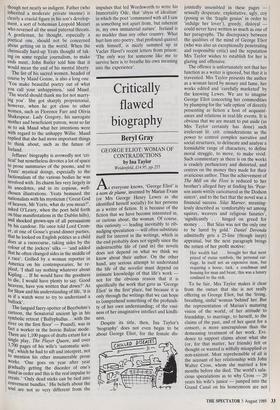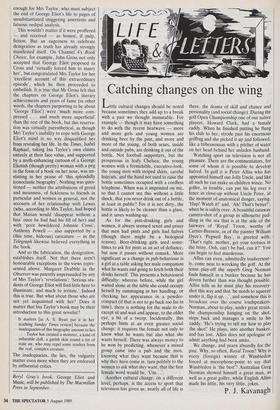Critically flawed biography
Beryl Gray
GEORGE ELIOT: WOMAN OF CONTRADICTIONS by Ina Taylor Weidenfeld, £14.95, pp.255 As everyone knows, 'George Eliot' is a nom de plume, invented by Marian Evans (or Mrs George Henry Lewes as she identified herself socially) for her persona as a writer of fiction. It is because of the fiction that we have become interested in, or curious about, the woman. Of course, this curiosity — leading inevitably to rib- nudging speculation — will often substitute itself for interest in the writings, which in the end probably does not signify since the indestructible life of (and in) the novels does not depend on what we think we know about their author. On the other hand, any serious attempt to understand the life of the novelist must depend on intimate knowledge of that life's work not for the obvious reason that it is specifically the work that gave us 'George Eliot' in the first' place, but because it is only through the writings that we can hope to comprehend something of the profundi- ty of her own understanding; of the vast- ness of her imaginative intellect and kindli- ness.
Despite its title, then, Ina Taylor's `biography' does not even begin to be about George Eliot, for the female dis- jointedly assembled in these pages sexually desperate, exploitative, ugly, coy (posing as the 'fragile genius' in order to `indulge her lover'), greedy, disloyal could never have written so much as one of her paragraphs. The discrepancy between the qualities of the mind of George Eliot (who was also an exceptionally penetrating and responsible critic) and the reputation Mrs Taylor wishes to establish for her is glaring and offensive.
The offence is unfortunately not that her function as a writer is ignored, but that it is travestied. Mrs Taylor presents the author as a woman lured by money and fame, her works edited and 'carefully marketed' by the knowing Lewes. We are to imagine George Eliot concocting her commodities by plumping for the 'safe option' of directly presenting as fiction a host of acquaint- ances and relations in real-life events. It is obvious that we are meant to put aside (as Mrs Taylor certainly has done) such irrelevant lit. crit. considerations as the power to control complex narrative and social structures, to delineate and analyse a formidable range of characters, to define moral struggle, to move, to make vivid. Such commentary as there is on the works is crudely perfunctory and distorted, and centres on the money they made for their avaricious author. Thus the achievement of The Mill on the Floss is reduced to her brother's alleged fury at finding his 'Pear- son aunts wittily caricatured as the Dodson sisters', and to the fact that the novel was a financial success. Silas Marner, meaning- lessly described as 'comfortably set among squires, weavers and religious fanatics', `significantly . . . hinged on greed for money . . . But Silas was not the only one to be lured by gold.' Daniel Deronda admittedly gets a 25-line (though inept) appraisal, but the next paragraph brings the return of her profit motive:
Her wealth had . . . brought her that most prized of status symbols, the personal car- riage. In itself not an expensive item, but requiring a horse, tack, a coachman and housing for man and beast, this was a luxury confined to the rich.
To be fair, Mrs Taylor makes it clear from the outset that she is not really offering us George Eliot, but the 'living, breathing, sinful' woman 'behind' her. But the representation of Marian's maturing vision of the world, of her attitude to friendship, to marriage, to herself, to the claims of the past, and of her quest for a consort, is more unscrupulous than the - demeaning treatment of her work. Evi- dence to support claims about what she (or, for that matter, her friends) felt or thought or wanted is wilfully misapplied or non-existent. Most reprehensible of all is the account of her relationship with John Walter Cross, whom she married a few months before she died. The world's sala- cious speculations as to why Cross — 20 years his wife's junior — jumped into the Grand Canal on his honeymoon are not
enough for Mrs Taylor, who must subject the end of George Eliot's life to pages of unsubstantiated sniggering assertions and fatuous oedipal analysis.
This wouldn't matter if it were proffered — and received — as honest, if pulp, fiction. But an eagerness to celebrate denigration as truth has already strongly manifested itself. On Channel 4's Book Choice, for example, John Gross not only accepted that George Eliot proposed to Cross and 'virtually forced him to marry her', but congratulated Mrs Taylor for her `excellent account of this extraordinary episode', which he then proceeded to embellish. It is true that Mr Gross felt that the chapters on George Eliot's literary achievements and years of fame (in other words, the chapters purporting to be about `George Eliot') were 'much more com- pressed . . . and much more superficial' than the rest of the book, but this reserva- tion was virtually parenthetical, as though Mrs Taylor's inability to cope with George Eliot's mind in no way disqualified her from revealing her life. In the Times, Isabel Raphael, taking Ina Taylor's own claims entirely at their face value, and supported by a myth-enhancing cartoon of a George Eliotish (though pretty) woman with a peg in the form of a book on her nose, was un- stinting in her praise of 'this splendidly iconoclastic biography'. Nothing was ques- tioned — neither the attributions of greed and meanness, of fickleness to friends in particular and women in general, nor the accounts of her relationship with Lewes (who, according to Mrs Taylor, had hoped that Marian would 'disappear without a fuss' once he had had his fill of her) and with 'poor bewildered Johnnie Cross'. Anthony Powell — also supported by a (this time, hideous) caricature — in the Telegraph likewise believed everything in the book.
And so the fabrication, the denigration, establishes itself. Not that there aren't honourable exceptions to the views repre- sented above. Margaret Drabble in the Observer was patently unpersuaded by any of Mrs Taylor's 'revelations': 'Serious stu- dents of George Eliot will find little here to illuminate, and much to irritate.' Indeed this is true. But what about those who are not yet acquainted with her? Does it matter that Ina Taylor's book may be their introduction to this great novelist?
It matters [as A. S. Byatt put it in her scathing Sunday Times- review] because the inadequacies of this biography amount to lies . . . Taylor has created a monster, a kind of inflatable doll, a garish skin round a lot of stale air, who may repel some readers from the real, complex creature.
The inadequacies, the lies, the vulgarity matter even more when they are endorsed by influential critics.
Beryl Gray's book, George Eliot and Music, will be published by The Macmillan Press in September.



















































 Previous page
Previous page